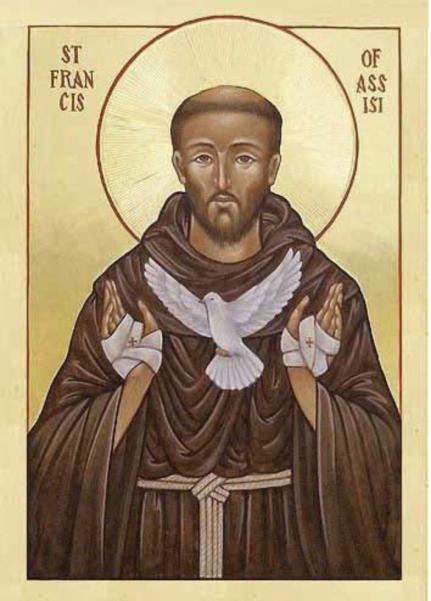Dear Friends,
The summer has well and truly finished now and we are into ‘the season of mists and mellow fruitfulness’ (as the poet John Keats put it) as well as some chilly nights and sometimes cool and windy days! However, the beauty of the season is apparent when the sun shines, and the colours of the leaves on the trees turning to a multiplicity of reds, oranges and yellows is wonderful although this hasn’t quite happened yet! As I write this, we still have quite a lot of our plants in flower in our sheltered and sunny garden at St George’s!
Harvest festivals are usually celebrated at the end of September or into October and we will be holding our Harvest Festival Service at St George’s on Sunday 12th October. Shortly before that is the Feast of St Francis of Assisi (on 4th October), who is a particularly important saint for me as I am a Third Order Franciscan. Francis or Francesco lived a remarkable but very hard and quite short life, and has been one of the most influential saints of the high Medieval period. His legacy continues in the Society of St Francis in the Anglican Church and the Franciscans of the Catholic Church: the First and Second Orders being the Franciscan brothers and sisters who live in Religious communities, whilst the Third Order is those of us who live ‘normal lives’ in the community and don’t wear habits but still take vows. Francis is probably best known for his love of the natural world and the creatures of the world. There’s a remarkable story of him taming a large wolf who was terrorising a particular village in Umbria, and there are plenty of other stories involving him with animals or birds, some of which may well be apocryphal!

What Francis can still do is point us to the importance of caring for God’s world, his creation. We are stewards of this beautiful world, which is so badly threatened by the climate crisis and global warming, as well as many other pressures related to human actives and mis-use of the earth’s resources. Francis challenges us to consider how we live our lives and how we can look after and care for the world and all its diversity of life better. Franciscan teaching sees our natural world as sacramental, displaying the colour, diversity and abundance of God’s love for the world and for us (from Sue McCoulough). Francis wrote the Canticle of the Creatures which is a beautiful prayer or poem praising God for the beauty and wonder of creation but also showing his deep sense of connection with the natural world.
All this is particularly relevant in this Season of Creation, as our Bishop Robert has talked about in his blog (available on the Diocese in Europe website). The message of Harvest Festival is that we should be thankful for all we have and for all God’s gifts to us, particularly in the light of so many who live in poverty in the world; and that we should care for the natural world as good stewards of God’s good creation. At St George’s we are also constantly reminded of those who gave their lives for freedom and liberty, to help build a better world, free of tyranny and violence but which also enables us to look after the natural world as it should be looked after.
I shall end this article with the Collect for Creation-tide:
Glorious God, the whole of creation proclaims your marvellous work: increase in us a capacity to wonder and delight in it, that heaven’s praise may echo in our hearts and our lives be spent as good stewards of the earth, through Jesus Christ our Lord. Amen.
God bless you all,
Richard

